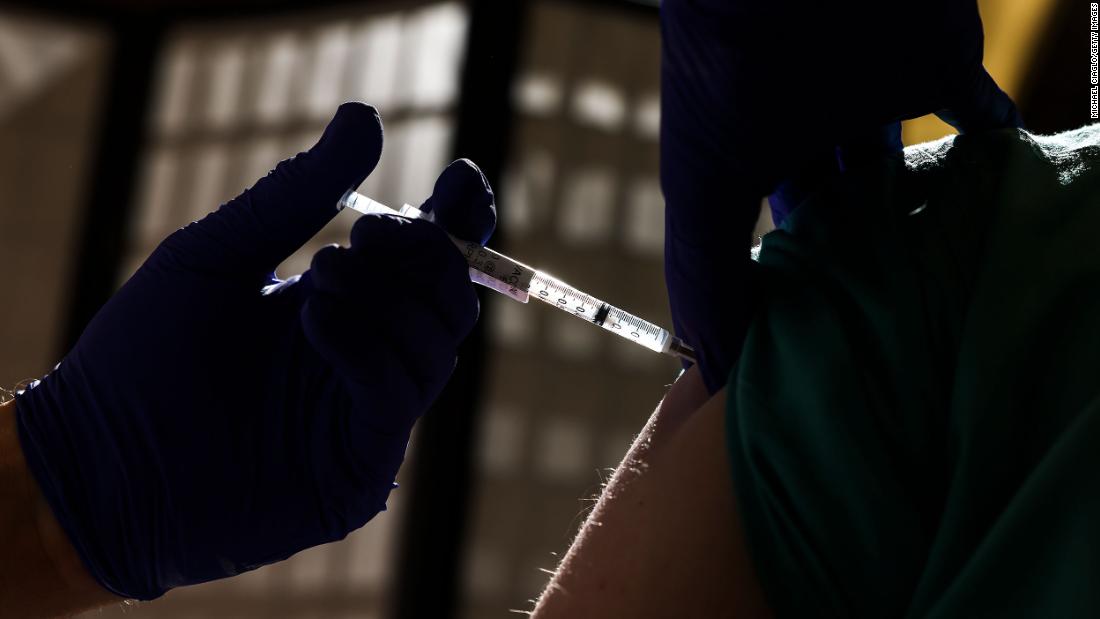
McCulloch, 27, lives with type 1 diabetes, as does her twin sister and father. The disease puts them at an increased risk of serious illness if they receive Covid-19.
“One of the first things my dad ever told me when I was diagnosed was that I would have to fight for myself and my health all my life,” McCulloch told CNN. “So when I came in and got the vaccine … I felt so relieved.”
Since then, many states have moved to vaccinating the following priority groups, such as other essential workers, older adults, and – most recently – those with co-morbidities or underlying medical conditions that put them at increased risk, such as diabetes.
But the move to vaccinate people with diabetes and other certain conditions has not been uniform across the country. In some states, people with co-morbidities are not yet eligible to receive the vaccine – and in states where they qualify, there is variation in what conditions a person is eligible for a vaccine and whether paperwork is needed to confirm that condition .
The underlying conditions that qualify
The CDC notes that adults of any age with the following underlying conditions are at an increased risk for serious Covid-19: cancer, chronic kidney disease, COPD, Down’s syndrome, heart disease, obesity and severe obesity, sickle cell anemia, smoking, and type 2 diabetes . The list also includes people with a weakened immune system due to organ transplantation and pregnancy.
Some states include only some of those conditions in the list of eligible conditions, while others may require someone to live with two or more of those conditions to qualify.
The state of Colorado, where McCulloch lives, has not yet begun to vaccinate people with certain co-morbidities or underlying health conditions, such as cancer, heart disease or diabetes.
McCulloch was able to get a first dose of the Moderna vaccine because a local pharmacist who vaccinated McCulloch’s mother said the pharmacy had some extra doses of the vaccine that it needed to administer quickly. Otherwise, the doses will expire and cannot be used.
“They had asked her if she had anyone she knew had diabetes, heart disease, all that stuff – and she basically said her husband and her two daughters both had diabetes,” McCulloch said. “So I could go.”
When McCulloch arrived at the pharmacy to receive the vaccine, the pharmacist asked for proof that McCulloch is living with diabetes. McCulloch said she showed the pharmacist a glucose monitoring sensor on her arm, some of her medical records that she keeps on an app, and her health insurance information.
“Just being in the right place at the right time allowed me to jump in line a bit and get my first dose,” McCulloch said. She is due to receive her second dose on February 15th.
“I recognize that I have a very privileged attitude because of the way the rollout was conducted and because my mother is a special education teacher,” said McCulloch.
“My dad and my twin sister, for example, haven’t gotten their vaccine yet,” she said. “That’s part of the problem right now – is that state rules differ so much, and at the end of the day, people with co-morbidities deserve the vaccine just as much as other people.”
Where people with comorbidity qualify
Some of those states have started to vaccinate this group, while others are just starting to pre-register. Within a state, the country can differ per province.
Vaccinations will begin soon this month in a number of other states.
On Wednesday, Illinois Governor JB Pritzker said in a press release, “Once we get enough vaccine, we won’t have to waste time protecting more of our most vulnerable population.”
‘Some … take up the honor system’
But how individuals confirm their underlying conditions differs from place to place.
In some states, such as New York and New Mexico, documentation is required with vaccination appointments to prove you have an underlying medical condition. For example, New Yorkers must provide a doctor’s statement, medical records, or a signed statement.
In some other states, such as New Jersey, Texas, and Virginia, no documentation is required.
Lara Anton, a spokesperson for the Texas Department of State Health Services, told CNN in an email Thursday, “We don’t want to put up barriers that prevent people from being vaccinated. To confirm chronic medical conditions, health care providers must refer to the person. medical history. If a healthcare provider does not have access to the person’s medical history, the person can disclose their qualifying medical condition themselves. They don’t need to provide documents to prove their eligibility. ”
Each state is different, “and some of these vaccine registration processes will take place according to the honor system,” said Lori Tremmel Freeman, chief executive officer of the National Association of County and City Health Officials, known as NACCHO.
As someone with high blood pressure, Freeman said she pre-signed up for a vaccine on an online waiting list in her Prince William County, Virginia community, in the underlying health conditions category. Covid-19 vaccines will be administered to that priority group once the province moves to the next vaccination phase.
“In the case of my own jurisdiction, pre-registration for people with underlying conditions is based on an honor system to tell you the truth,” she said. “I didn’t have to provide proof of medication, a diagnosis of the underlying condition, or anything like that.”
Freeman said there are several ways residents can find out if they are eligible for a Covid-19 vaccine, such as through their local health department, community organizations, or the faith community.
McCulloch, who has received her first dose in Colorado, is certainly looking forward to seeing her twin sister and father become eligible for vaccination in their communities.
“I believe in health care, and I believe in science,” said McCulloch. “This is critical to the health and safety of our population.”
CNN’s Ashley Ahn contributed to this report.



